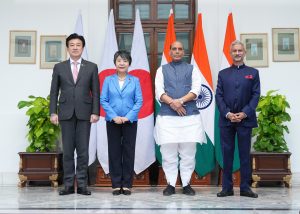The foreign and defense ministers of Japan and India have agreed on a series of measures to enhance their bilateral defense cooperation with China’s growing economic, political, and military influence in the Indo-Pacific region in mind. As part of that effort, Tokyo plans to export stealthy antennas for naval communications to New Delhi.
The third Japan-India Foreign and Defense Ministerial Meeting, informally known as “two-plus-two” talks, took place on August 20 in New Delhi. Indian External Affairs Minister Subrahmanyam Jaishankar and Defense Minister Rajnath Singh met with their Japanese counterparts, Kamikawa Yoko and Kihara Minoru.
A joint statement noted that the four ministers reaffirmed their commitment to maintaining and strengthening the rules-based international order and opposed any unilateral attempt to change the status quo, in an apparent reference to China’s increasingly assertive economic and military activities in the region.
The joint statement also noted that the ministers shared the intention to revise and update the joint declaration on security cooperation signed by Japan and India in October 2008 “to reflect contemporary priorities and be responsive to contemporary security challenges facing them.” Specifically, the ministers aim at deepening bilateral cooperation in field of space and cyber, the joint statement said.
Indian Prime Minister Narendra Modi is expected to visit Tokyo later this year with the aim of reaching an updated agreement between the leaders of two nations, according to the Japanese Foreign Ministry.
The two sides also discussed the transfer to India of the latest radar equipment used for the Mogami-class multirole frigate of the Japanese Maritime Self-Defense Force.
The naval antenna, which is set to be exported to India, is called “UNICORN” and was jointly developed by several Japanese companies, with NEC as the main contractor.
The name stands for “Unified Complex Radio Antenna.”
UNICORN is the NORA-50 integration mast currently equipped on top of the bridge of the Mogami-class frigate. It is a new type of composite communications antenna system for naval ships. UNICORN stacks multiple antennas one on top of the other and covers the entire system with an enclosure, thus reducing the radar cross section (RCS) of the antennas, which increases stealth by making it more difficult for any enemy to detect naval vessels.
In contrast, conventional ships have had multiple antennas mounted individually on their masts.
UNICORN has a spire-shaped dome that houses the antennas for Link 16, which is a military tactical data link network used by NATO members and other Western nations. It also has TACAN (Tactical Air Navigation System) and Identification Friend or Foe (IFF) antennas, in addition to various ESM (Electronic Support Measures) systems, among other antennas.
At a press conference on August 20 in in New Delhi, Kihara explained that, as Japan’s minister of defense, he had approved the UNICORN project with a grant of about 1.5 billion yen ($10.3 million), the first of its kind from the ministry’s newly established Defense Equipment Transfer Facilitation Fund.
If realized, this will be Japan’s second export of a finished defense equipment item, following the transfer of air surveillance radar systems to the Philippines.
The ministers also agreed to advance joint drills between the Japan Self-Defense Forces and the Indian military.
Furthermore, the ministers welcomed the JMSDF and Indian Navy exploring future cooperation in the area of ship maintenance in India, which may lead to improvement in flexible operations of the JMSDF in Indian Ocean region.
“Bilateral relations between the two nations have increased in all areas. Defense has emerged as an important pillar in these relations,” Singh, India’s defense minister, said during the meeting.
“I believe that this has become an extremely significant opportunity to quantitatively and qualitatively expand and deepen future defense cooperation and exchanges between Japan and India,” Kihara stressed at the press conference.
India has promoted “strategic autonomy” and pursued a neutral diplomacy that does not form alliances with any country.
Because India shares a border of about 3,500 kilometers with China, with several disputed sections, it has avoided unnecessary tension and confrontation with Beijing. However, as China’s Xi Jinping administration grows more confident in its own national power and increases its influence among countries surrounding India, the Modi administration appears to be increasingly strengthening its political and diplomatic efforts to check China, aiming to reinforce its relations with Western countries, including Japan. Today India is even pursuing military cooperation with its partners without hesitation.
On the other hand, Japan wants to strengthen ties between India and the Western bloc, including Japan and the United States, in order to contain China and Russia.

































